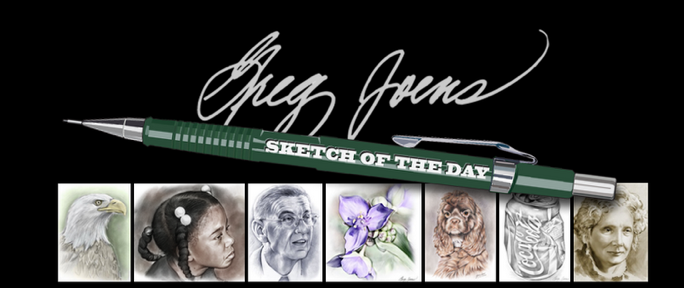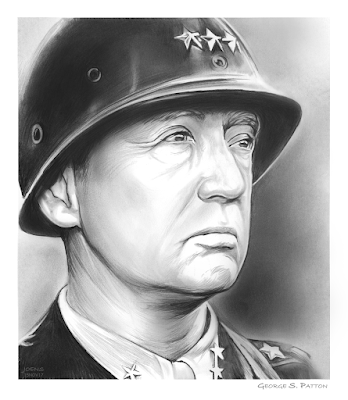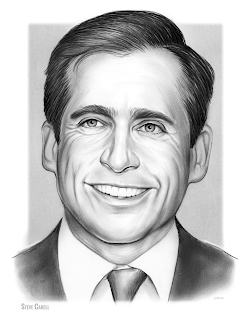General George S. Patton
Sketch of the Day for Wednesday, November 15, 2017
General George Smith Patton Jr. (November 11, 1885 – December 21, 1945) was a senior officer of the United States Army who commanded the U.S. Seventh Army in the Mediterranean and European theaters of World War II, but is best known for his leadership of the U.S. Third Army in France and Germany following the Allied invasion of Normandy in June 1944.
Born in 1885 to a family with an extensive military background (with members having served in the United States Army and Confederate States Army), Patton attended the Virginia Military Institute and the U.S. Military Academy at West Point. He studied fencing and designed the M1913 Cavalry Saber, more commonly known as the "Patton Sword", and partially due to his skill in the sport, he competed in the 1912 Summer Olympics in Stockholm, Sweden. Patton first saw combat during the Pancho Villa Expedition in 1916, taking part in America's first military action using motor vehicles. He later joined the newly formed United States Tank Corps of the American Expeditionary Forces and saw action in World War I, commanding the U.S. tank school in France before being wounded while leading tanks into combat near the end of the war. In the interwar period, Patton remained a central figure in the development of armored warfare doctrine in the U.S. Army, serving in numerous staff positions throughout the country. Rising through the ranks, he commanded the 2nd Armored Division at the time of the American entry into World War II.
Patton led U.S. troops into the Mediterranean theater with an invasion of Casablanca during Operation Torch in 1942, where he later established himself as an effective commander through his rapid rehabilitation of the demoralized U.S. II Corps. He commanded the U.S. Seventh Army during the Allied invasion of Sicily, where he was the first Allied commander to reach Messina. There he was embroiled in controversy after he slapped two shell-shocked soldiers under his command, and was temporarily removed from battlefield command for other duties such as participating in Operation Fortitude's disinformation campaign for Operation Overlord. Patton returned to command the Third Army following the invasion of Normandy in June 1944, where he led a highly successful rapid armored drive across France. He led the relief of beleaguered American troops at Bastogne during the Battle of the Bulge, and advanced his Third Army into Nazi Germany by the end of the war.
After the war, Patton became the military governor of Bavaria, but he was relieved of this post because of his statements trivializing denazification. He commanded the United States Fifteenth Army for slightly more than two months. Patton died in Germany on December 21, 1945, as a result of injuries from an automobile accident twelve days earlier.
Patton's colorful image, hard-driving personality and success as a commander were at times overshadowed by his controversial public statements. His philosophy of leading from the front and his ability to inspire troops with vulgarity-ridden speeches, such as a famous address to the Third Army, attracted favorable attention. His strong emphasis on rapid and aggressive offensive action proved effective. While Allied leaders held sharply differing opinions on Patton, he was regarded highly by his opponents in the German High Command. A popular, award-winning biographical film released in 1970 helped transform Patton into an American hero.
Source: Wikipedia
Sketch of the Day for Wednesday, November 15, 2017
General George Smith Patton Jr. (November 11, 1885 – December 21, 1945) was a senior officer of the United States Army who commanded the U.S. Seventh Army in the Mediterranean and European theaters of World War II, but is best known for his leadership of the U.S. Third Army in France and Germany following the Allied invasion of Normandy in June 1944.
Born in 1885 to a family with an extensive military background (with members having served in the United States Army and Confederate States Army), Patton attended the Virginia Military Institute and the U.S. Military Academy at West Point. He studied fencing and designed the M1913 Cavalry Saber, more commonly known as the "Patton Sword", and partially due to his skill in the sport, he competed in the 1912 Summer Olympics in Stockholm, Sweden. Patton first saw combat during the Pancho Villa Expedition in 1916, taking part in America's first military action using motor vehicles. He later joined the newly formed United States Tank Corps of the American Expeditionary Forces and saw action in World War I, commanding the U.S. tank school in France before being wounded while leading tanks into combat near the end of the war. In the interwar period, Patton remained a central figure in the development of armored warfare doctrine in the U.S. Army, serving in numerous staff positions throughout the country. Rising through the ranks, he commanded the 2nd Armored Division at the time of the American entry into World War II.
Patton led U.S. troops into the Mediterranean theater with an invasion of Casablanca during Operation Torch in 1942, where he later established himself as an effective commander through his rapid rehabilitation of the demoralized U.S. II Corps. He commanded the U.S. Seventh Army during the Allied invasion of Sicily, where he was the first Allied commander to reach Messina. There he was embroiled in controversy after he slapped two shell-shocked soldiers under his command, and was temporarily removed from battlefield command for other duties such as participating in Operation Fortitude's disinformation campaign for Operation Overlord. Patton returned to command the Third Army following the invasion of Normandy in June 1944, where he led a highly successful rapid armored drive across France. He led the relief of beleaguered American troops at Bastogne during the Battle of the Bulge, and advanced his Third Army into Nazi Germany by the end of the war.
After the war, Patton became the military governor of Bavaria, but he was relieved of this post because of his statements trivializing denazification. He commanded the United States Fifteenth Army for slightly more than two months. Patton died in Germany on December 21, 1945, as a result of injuries from an automobile accident twelve days earlier.
Patton's colorful image, hard-driving personality and success as a commander were at times overshadowed by his controversial public statements. His philosophy of leading from the front and his ability to inspire troops with vulgarity-ridden speeches, such as a famous address to the Third Army, attracted favorable attention. His strong emphasis on rapid and aggressive offensive action proved effective. While Allied leaders held sharply differing opinions on Patton, he was regarded highly by his opponents in the German High Command. A popular, award-winning biographical film released in 1970 helped transform Patton into an American hero.
Source: Wikipedia





